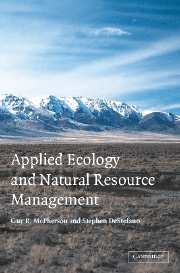1 - Integrating ecology and management
Published online by Cambridge University Press: 11 November 2009
Summary
Ecology is the scientific study of the interactions that determine the distribution and abundance of organisms (Krebs 1972). Predicting and maintaining or altering the distribution and abundance of various organisms are the primary goals of natural resource management; hence, the effective management of natural ecosystems depends on ecological knowledge. Paradoxically, management of ecosystems often ignores relevant ecological theory and many ecological investigations are pursued without appropriate consideration of management implications. This paradox has been recognized by several agencies and institutions (e.g., National Science Foundation, U.S. Forest Service, U.S. Fish and Wildlife Service, Bureau of Land Management, Environmental Protection Agency) (Grumbine 1994; Alpert 1995; Keiter 1995; Brunner and Clark 1997) and entire journals are dedicated to the marriage of ecology and management (e.g., Journal of Applied Ecology, Conservation Biology, Ecological Applications). Nonetheless, the underlying causes of this ambiguity have not been determined and no clear prescriptions have been offered to resolve the paradox. The fundamental thesis of this book is that ecological principles can, and should, serve as the primary basis for the management of natural ecosystems, including their plant and animal populations.
Some readers will undoubtedly argue that managers are not interested in hearing about ecologists' problems, and vice versa. Although we fear this may be true, we assume that progressive managers and progressive scientists are interested in understanding problems and contributing to their solution. Indeed, progressive managers ought to be scientists, and progressive scientists ought to be able to assume a manager's perspective.
- Type
- Chapter
- Information
- Applied Ecology and Natural Resource Management , pp. 1 - 16Publisher: Cambridge University PressPrint publication year: 2002

